Blog post written by Olivia Turner
On 9th May 2024, we held a hybrid workshop at St Columba’s Hospice Care, Edinburgh, as part of our IMAGINED project.
IMAGINED stands for Investigating Meaning-making and the cocreation of Guidelines for Evaluation IN participatory Arts for Dementia. The project is led by ECRED in partnership with the Royal Conservatoire of Scotland, University of Florida, Queen Margaret University, St Columba’s Hospice Care, Music in Hospitals and Care and Scottish Ballet. It is funded by the Arts and Humanities Research Council.
In this blog, we provide background to the project and outline what happened at a recent workshop where our team came together to engage in knowledge-exchange and co-design.
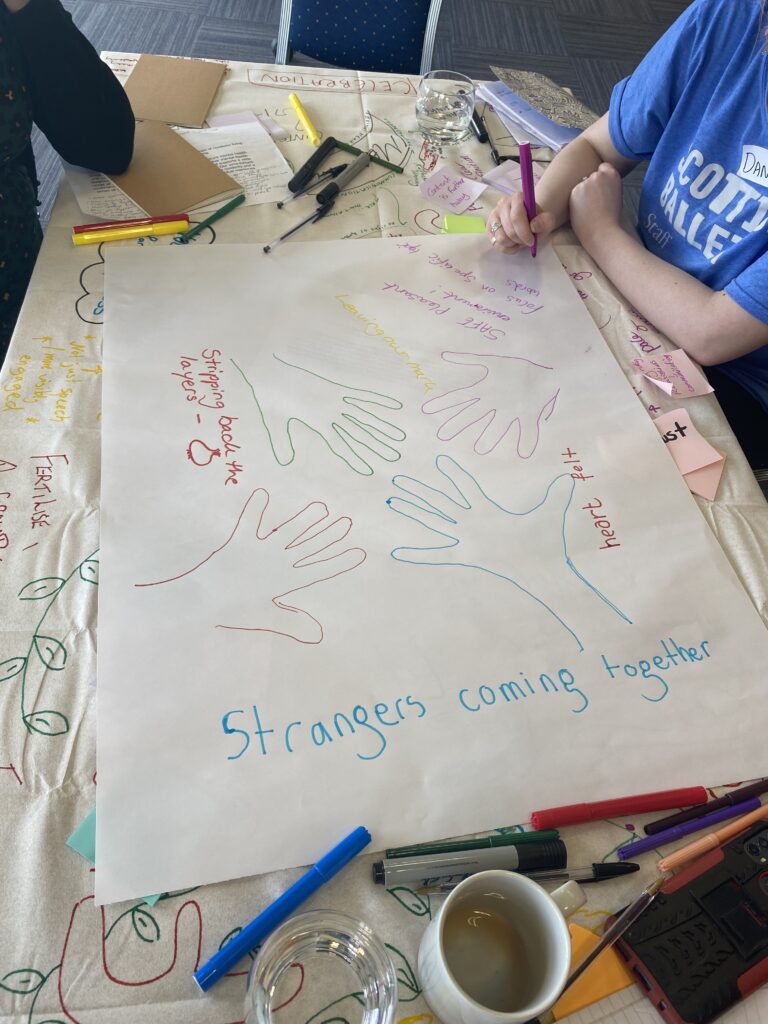
Background to IMAGINED
‘The emphasis of the arts is on experience, feeling, imagination, and meanings that lie to the side of our vision, meanings that may be masked and cannot easily be measured’ (Zeilig et al., 2014, p.26).
This quote was published 10 years ago, and it still resonates. Many people working in the field of arts and dementia feel that current evaluation processes do not capture the nuance of experience, feeling, imagination and meaning at the heart of this work.
As part of this IMAGINED project, we ask: Is it possible to co-create evaluation principles, guidelines, or tools that may enable more authenticity, depth, richness, meaning and nuance in evaluation? This question is particularly important to explore, in view of arts organisations and others delivering arts and dementia programmes to evidence the value of their work to funders and other stakeholders.
With this landscape in mind, our project has three core aims:
- Explore how ‘meaning’ and ‘meaning-making’ processes may be (inter)connected to health and wellbeing.
- Explore the role of ‘meaning’ and ‘meaning-making’ processes in the experiences of participatory arts activities for those living with dementia.
- Co-create practical evaluation guidelines for those delivering participatory arts projects (e.g., artists, arts/community organisations).
We hope the research and new guidelines will support with articulating the value of participatory arts projects for those living with dementia.
Our workshop
The workshop took place at No.17, part of St. Columba’s Hospice Care in Edinburgh: a beautiful venue surrounded by views of the sea. It was the perfect location for bringing the team together to set intentions and a shared purpose for the project, while facilitating a relaxed, laughter-filled atmosphere.
We were joined by 18 members of the team, featuring project investigators, researchers, musicians, dancers, organisational partners, lived experience advisors, and our co-production group. Our international team travelled from Jerusalem, Florida, Wales, England and Scotland.
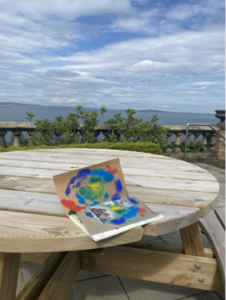
Ways of working and thinking together: Why a workshop?
A co-produced approach that centres meaning and lived experience is central to our project. The hybrid workshop provided an opportunity to bring the team together and create an environment that was inclusive, creative and inspiring. We wanted to learn from each other, build connections, ‘horizontalize’ research power structures, foster critical and creative thinking, and to collaborate.
Evaluation in arts & dementia
Giorgos Tsiris (St Columba’s Hospice Care and Queen Margaret University) began the workshop with an overview of arts and health evaluation, asking why evaluating is valuable and how it can be a meaningful practice. He touched on the tension felt by creative practitioners that their experiences and meaningful connections created within participatory arts settings do not easily fit within current evaluation processes to demonstrate measurable impact to funders. Whilst this is a complex landscape, he stressed the importance of fostering a ‘questioning stance’ for evaluation practices, asking: what is specific to arts & health evaluation and evaluation in dementia? Giorgos concluded that we need to understand what makes good evaluation, whilst also questioning existing knowledge hierarchies and processes.
What does IMAGINED mean to you?
Katey Warran and Olivia Turner (ECRED, The University of Edinburgh) led the next session, asking: what does IMAGINED mean to you? During this session, Martin Robertson and Agnes Houston MBE, members of the IMAGINED Co-Production Group living with dementia, talked about their personal experiences of co-production at ECRED and its value. This provided an opportunity to reflect on our ethos and co-produced methodology for the project.
As Martin outlined, co-production is really important in the context of dementia research. It is vital to recognise different types of knowledge, including both formal academic processes and lived experiences, and to acknowledge that “we’re human”. Martin also went on to express how being involved in co-produced research projects, like those at ECRED, is “like catnip to the brain” and how he sees further benefits in having opportunities for mental stimulation and “brain teasers”.

Agnes followed, drawing on her experience of creativity and activism in dementia research, to say that co-production is “a different means for getting your message out there” and how it is a symbiotic relationship, “like nature: the plants co-produce together, the butterflies co-produce with the plants… and everything evolves.” She explained the value of non-hierarchical research, where all voices are listened to and how “the outcome is that we want to flourish.”
Break-out group activities
Hearing the experiences of Agnes and Martin set the scene for the next activity. The team separated into groups to explore key concepts and terms identified in the IMAGINED project: meaning, meaning-making, dementia, holistic health, wellbeing, arts, and participation. The groups were also invited to identify any missing words that they thought were significant for the project. This included: person-centred, process, personalisation, communication, and cross-pollination. The activity highlighted the breadth of perspectives and need for the team to create a shared language and understanding for these concepts.
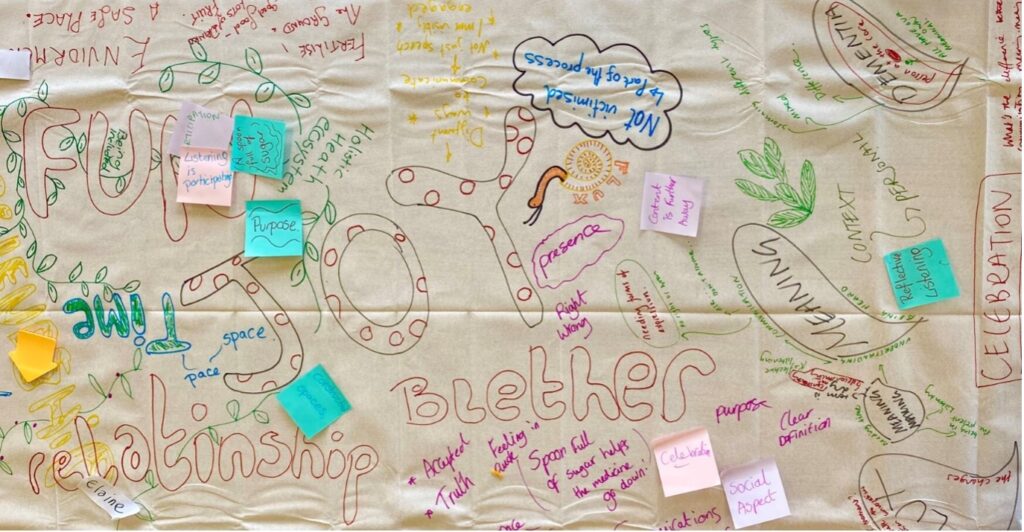

The importance of tea and biscuits
Breaks were offered throughout the day and, for those in person, were accompanied by tea and biscuits. The team reflected on how important tea and biscuits were to bring the team closer together by providing opportunities for informal social spaces and laughter. However, these ‘watercooler’ moments felt missed by some joining online, and we will look at ways to try to facilitate online informal social spaces at break times in the future.
During the lunch break, the IMAGINED team were warmly greeted by St. Columba’s Hospice Care staff and given a tour of the hospice by Giorgos. There was much inspiration and care to be found, from the warmth of the hospice staff and interior design, dedicated arts and music rooms, large windows overlooking the sea views, to the volunteers who arrange beautiful flowers throughout.
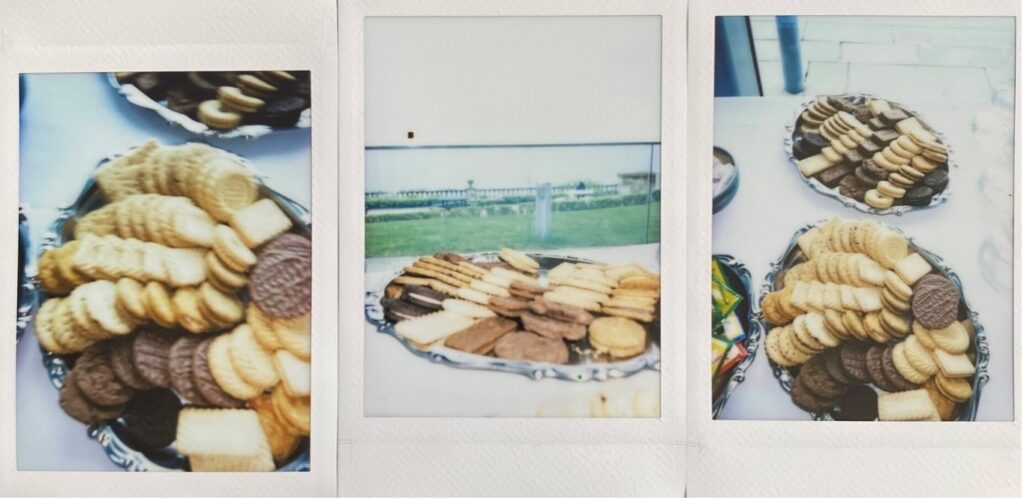
Creative Methods
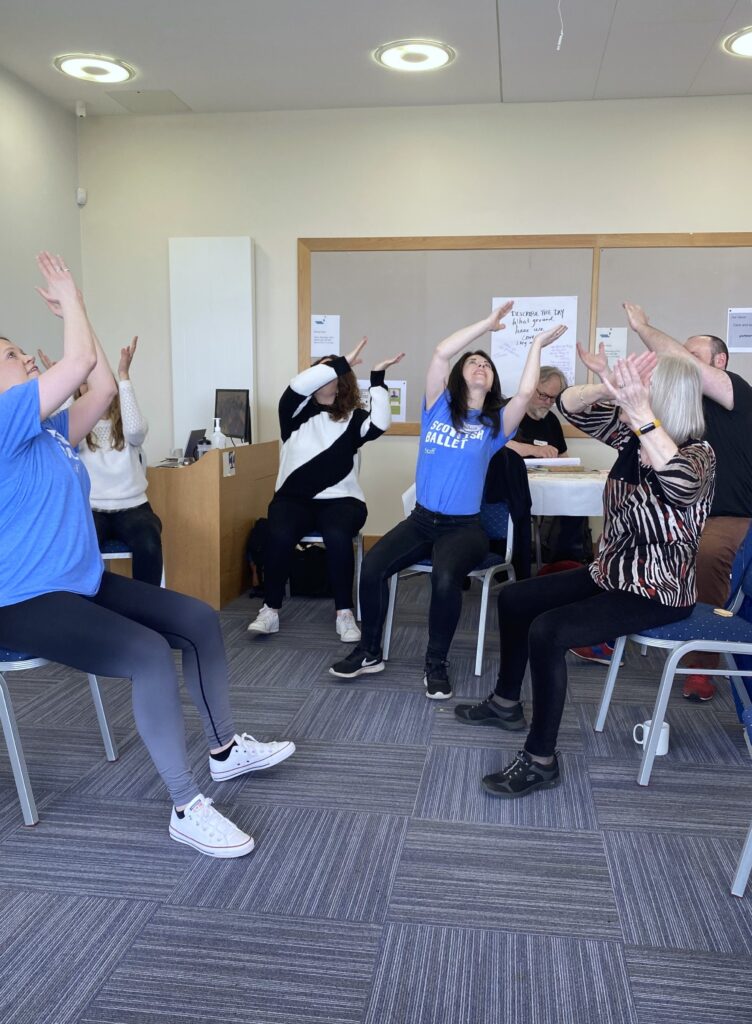
The day was punctuated by ‘Creative Energisers’ led by Music in Hospitals and Care and Scottish Ballet. These sessions used movement, sound, rhythm and body percussion to get our bodies moving and build a sense of togetherness, as well as to explore embodied and tacit ways of knowing. It stimulated thinking about how to evaluate experiential, emotional and temporal engagement.
In response to the ‘Creative Energisers’, Jimmy Turner (The BINKS Hub, The University of Edinburgh) delivered an interactive session to prompt thought and discussion around how we can use creative evaluation methods to capture the complex multi-sensory experiences, emotions and atmospheres generated within participatory arts settings. We reflected together that non-verbal and visual forms of evaluation are particularly beneficial to be inclusive.
Case Studies
Scottish Ballet and Music in Hospitals and Care led additional breakout groups to explore case study examples of their participatory arts and dementia programmes.
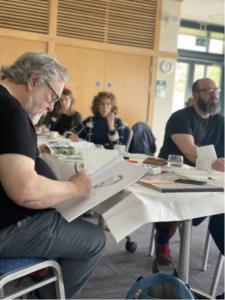
Music in Hospitals and Care highlighted key examples, such as:
- Supporting individuals living with dementia in care home settings.
- working with groups of residents living with dementia in a mental health setting.
- Working with organisations to support regular drop-in community café for people living with dementia, carers, friends and family.
- Working with partners, such as Alzheimer’s Society, to bring Singing for the Brain sessions to those living with dementia.
Scottish Ballet expanded on their dementia-friendly dance classes and programmes. Notably Time To Dance®, a dance programme for people living with dementia or memory loss, their families, friends, children, grandchildren, partners and carers. The classes take place at Scottish Ballet headquarters in Glasgow, care homes and community settings. They reflected on the value of working closely with academics, such as Bethany Whiteside (Royal Conservatoire of Scotland) who undertook previous research to understand the impact of the Time To Dance programme through the social and emotional experiences of group participants.
Reflecting Together
Beyond the structured sessions, the team were also encouraged to reflect throughout the day using creative methods, which included a Polaroid camera to take photographs; poetry, writing and drawing in notebooks; walks in the gardens to take a breath and enjoy the views. It was commented on how the structure of the workshop provided a spacious and inspiring environment to encourage reflective practice and gentle networking.
The day was ended with a creative activity led by Jenny Baxley Lee (UF Health Shands Arts in Medicine and UF Center for Arts in Medicine, University of Florida). Through the Surrealist game ‘Exquisite Corpse’, we created a series of collaborative poems using the following questions as prompts for reflecting on the workshop and the IMAGINED project:
- How did we get there?
- What is your part to play?
- What key questions linger and what insights will you take with you today?
Here is one of the collective poems created:
Are you listening?
Are you listening?
It is so loud and busy and chaotic
What do we do with all the noise?
I want to translate our collective voice.
Can we create opportunity and choice?
Trainings and helping to mould participants.
How will you describe the day with a colour?
It is the colour of the tulips outside, and so many colours besides
I feel embraced by the group, I wonder if you do too?
Some of me, part of my being, but the rebel is manning the barricades
Asking when are we truly free?
By creating space for each other
Are we listening?
Final thoughts
The hybrid workshop provided a brilliant opportunity to bring the whole IMAGINED team together to work collaboratively. It was important for us to always provide opportunities for the online participants to voice their reflections throughout the day. The hybrid facilities at No.17 were excellent and helped to integrate those joining online to feel as though they were in the room.
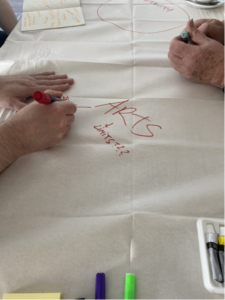
The discussions that emerged from the day demonstrate a wider desire to reflect on the meaningful and personal experiences the arts can offer to people living with dementia. It highlighted the need to consider methods specific to arts & health evaluation and evaluation in dementia, beyond conventional practices.
To consider these reflections more deeply, we are now moving onto the next phase of the project. As part of this, we will be working closely with Scottish Ballet and Music in Hospitals and Care for a multi-sited ethnography across key locations where they deliver their arts and dementia programmes. We will also be creating and disseminating a survey to map arts and dementia programmes across the UK and to understand the current evaluation practices used. The data captured will inform the co-produced evaluation guidelines.
To keep updated on the IMAGINED project, visit our project page and the ECRED blog.

With thanks
Thank you to everyone who attended the workshop and to our co-production group, St Columba’s Hospice Care, Royal Conservatoire of Scotland, University of Florida, Queen Margaret University, Music in Hospitals and Care, and Scottish Ballet.
To find out more about the IMAGINED project, please contact Olivia Turner (olivia.turner@ed.ac.uk)

